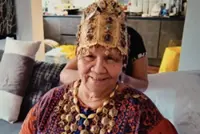
Getting ready for the big day: Sumarwan massaging a cow at his ‘salon’ in a makeshift livestock market in Jakarta. — AFP
Under a highway in Jakarta, a brown cow stood calmly as masseur Sumarwan got to work, clenching his fist to beat the animal’s legs and help it relax ahead of its sacrifice.
The two-year-old cow was receiving a unique rub-down to keep it in good condition before its sale for Hari Raya Aidiladha on Monday.
“The cow feels relaxed,” the 45-year-old said as he gently kneaded the animal’s muscles.
Sumarwan, who like many Indonesians goes by one name, made noises at the cow as he massaged – his way of communicating with it at his self-described “cow salon”.
“If I beat it using my hands like this, the cow feels relaxed because it knows that I do it with love,” he claimed.
“If other people do it, it may get angry because it feels like being hurt.”
Sumarwan says he is one of only two people in this area of North Jakarta able to give cattle massages for the major holiday in the Islamic calendar.
His cow salon is tucked inside an underpass that has become a makeshift livestock market, where sellers trade hundreds of cows and goats.
As trucks and trailers thunder by on the motorway overhead, the animals look unbothered.
But the market’s location is ideal despite the traffic, Sumarwan said, sheltered by the overpass from Jakarta’s tropical heat and spurts of heavy rain.
“One of the requirements for a cow to be sacrificed is that the animal has to be healthy,” he added.
For a cow that looks unhealthy, Sumarwan applies a balm usually reserved for humans.
The makeshift market is one of many spread around Jakarta selling animals for the Muslim ritual, when livestock are slaughtered and the meat is shared with the poor.
Kastono, Sumarwan’s boss, has run his animal sacrifice business for 15 years, bringing livestock from Central Java to sell in Jakarta.
“This year, we brought 50 cows and 120 goats. We usually start selling 25 days before Aidiladha,” said Kastono, who employs 10 workers.
A cow weighing 250kg can sell between 20mil and 27.5mil rupiah (RM5,780 and RM7,950), according to Kastono’s wife Meta.
And keeping the animals healthy and happy is important for business.
Meta said they began uploading short videos to social media showing the cows being massaged in a small booth with a “Cow Salon” sign in the background as a way to improve sales.
“We want to attract customers with something unique, also to show that we treat the animals well,” she said.
But Kastono said his business was about more than just making money.
“What we do is correlated with the religious ritual, so we are not focusing on looking for big profits.
“We don’t want to put more burden on the people.
“We make a salon for the cows... because we want to make sure they are in good shape,” he said. — AFP











































